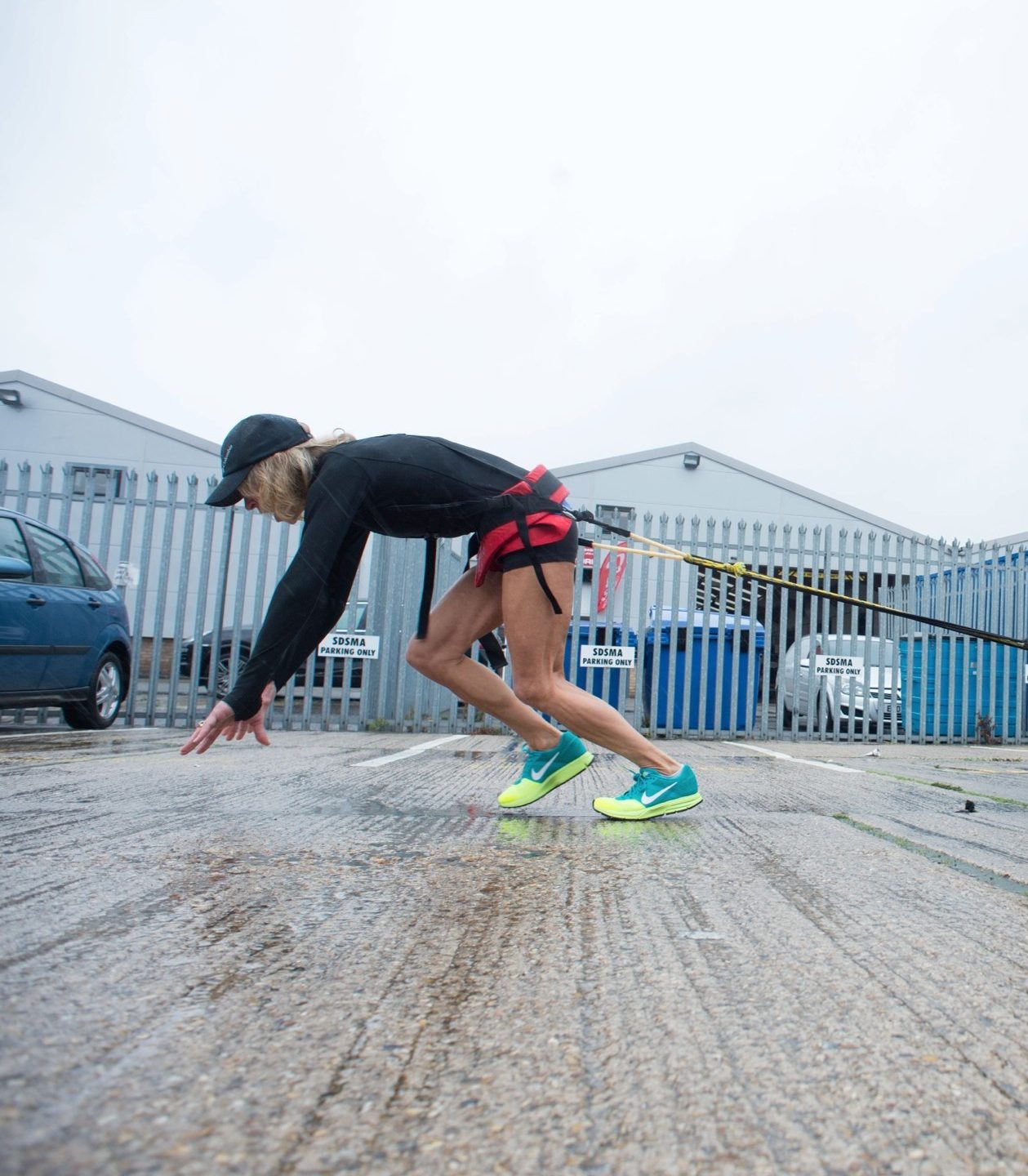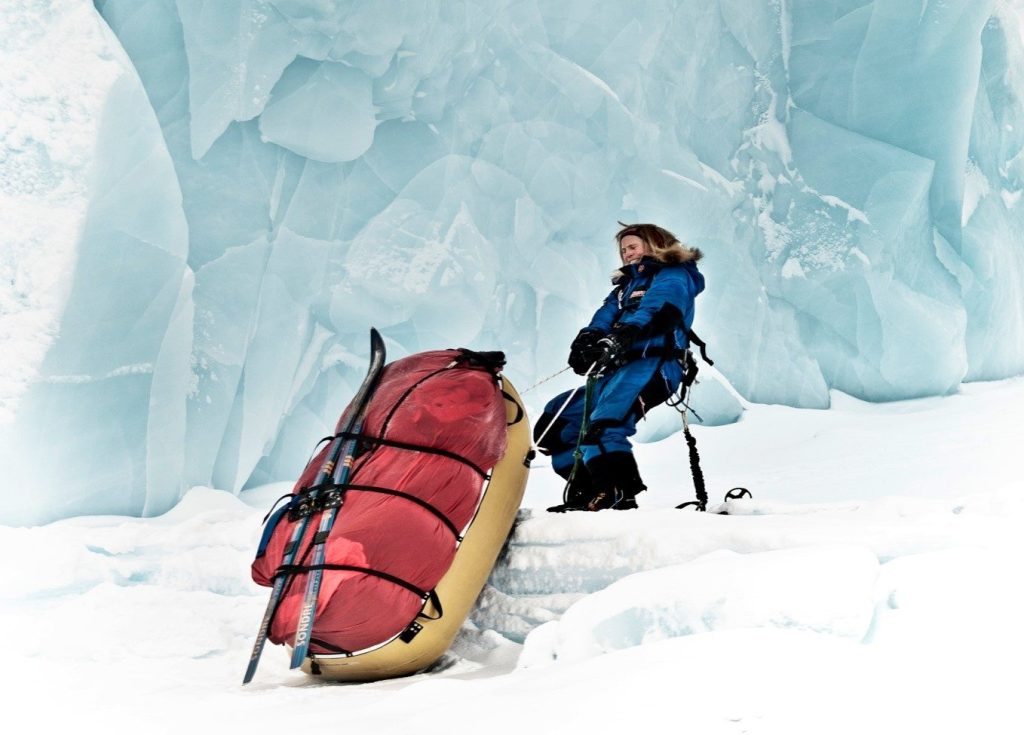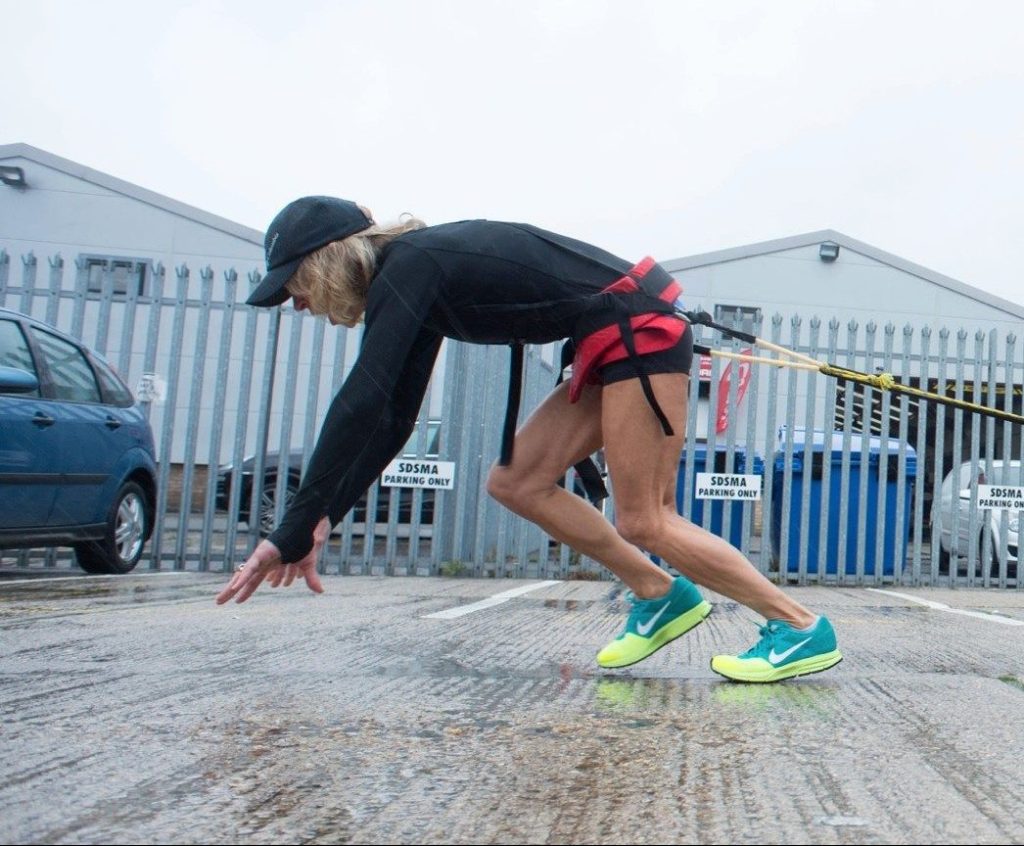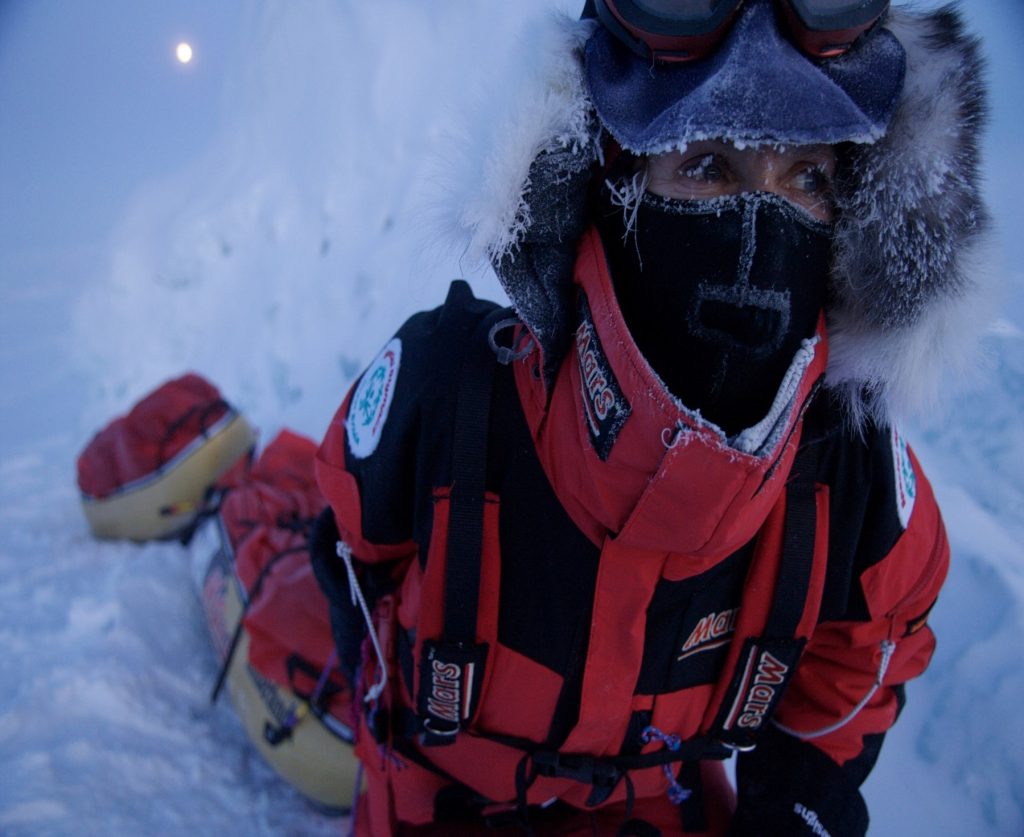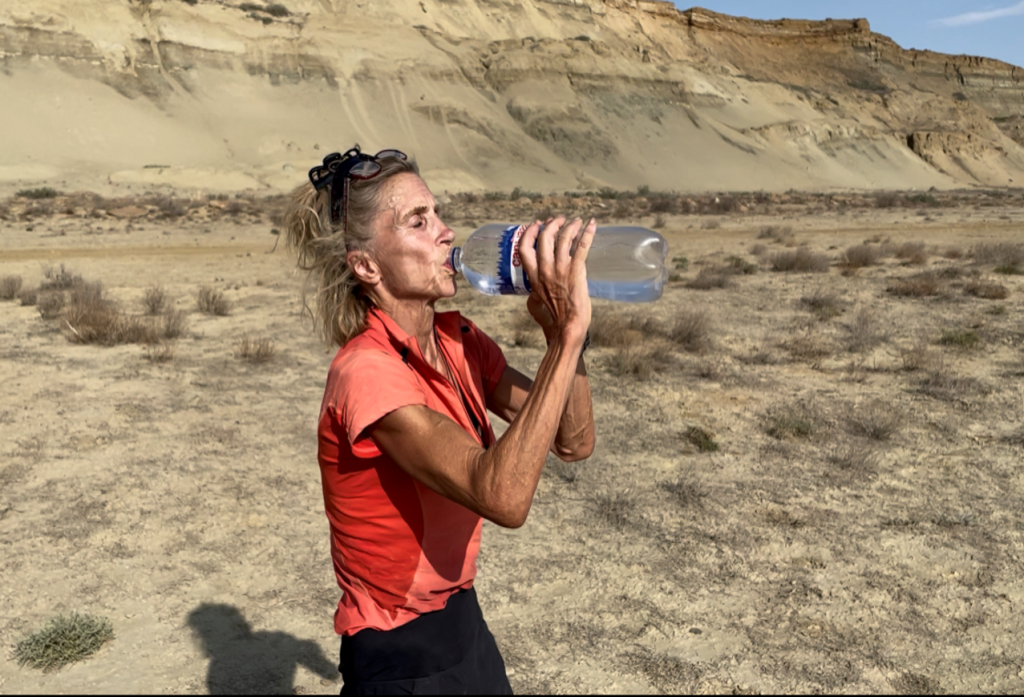Rosie Stancer, 63, is a polar athlete and explorer. Through her expeditions she’s pushed the limits of endurance under extreme conditions and is continuing to do so. She may not be built in the image of Scott, Shackleton and Amundsen, yet Rosie has not let limiting gender stereotypes stop her. In fact, she views her femininity as her greatest asset. One journalist memorably described her as a cross between “Tinkerbell and the Terminator”.
Born into a life of privilege, she is a cousin of Her late Majesty the Queen, she explains how she broke free of societal expectation and describes how we all have the potential to harness our inner strength to achieve our dreams.
When my career path took a pronounced swing away from the frothy, high-heeled world of public relations to the ice boots of polar exploration, it rather startled the ‘old school’ of explorers. A female polar explorer was a rare species in an area hitherto a bastion of male testosterone.
Whilst the pre-conceived image of your polar explorer was male, rugged, rippling biceps and a beard, I am on the petite side at a smidge over 5.2”, weighing in at a featherweight 7 ½ stone (with my lipstick on). I’m married, and a mother. I was already 37 when I embarked on polar exploration, I’m still mounting expeditions at 63 years old, and I haven’t got a beard yet either.
However, the world of exploration and, indeed any walk of life, is not about the size of your biceps, it’s about what’s in your head and heart. It’s about mental strength. Gender, size, shape, beard or no beard, none of that matter. On the contrary, I have, through expeditions, found that femininity is my most powerful asset. Ranking high in value amongst the list of attributes we have, I would include our tuned in intuition which we harness to great use, not ignore, we have higher thresholds of pain than most men, and we are natural communicators which makes for good team dynamics. And we’re flexible, physically and mentally, and flexibility is strength – rigidity is brittle. Women make excellent expeditioners, and all our feminine built-in qualities should be encouraged from grass roots. Why can’t we climb trees with the boys?
As a little girl, I loved climbing trees. I was born into a privileged background, but I was a scuffed-up tomboy, dressed in my older brother’s hand-me-downs. In a multitude of ways my upbringing prepared me for gate-crashing into a man’s world. Brought up in the idyllic but not wildly social setting of the lake district, my brother and I were left to my own devices and would go off on long bike rides, often to escape the suffocating discipline of a strict nanny. These were frequently solo expeditions as I could never quite keep up with my brother. Consequently, I would, on occasion, become a cropper on the steeper hills of the Pennines through taking completely reckless risks over speed and steering, (with the scars still to prove it) or climbing up trees behind my brother and beyond my ability, too often having to be rescued with long ladders. Risk assessment wasn’t part of my young plans. But with hindsight, all these experiences taught me about risk-taking, helped develop my periphery sense of danger and perhaps above all taught me that if you aim high, you have to expect to work hard and be prepared to take the knocks.
I grew to love the thrill in going off on a lone adventure, I embraced even then the beauty of isolation and relished having the Cumbrian wilderness all to myself.
Rosie Stancer
Three decades later, when my compass needle swerved into the world of polar exploration, I was and remain, bemused when people express admiration for my coping not so much with the extreme temperatures as the prolonged periods of isolation and solitude. Ironically, this comment often arises in a crowded, noisy party setting, which is precisely the place I can feel desperately lonely in. How can people not be content in their own company? Maybe it’s because I can comfortably re-tune into the same sense of isolation, I immersed myself into in my childhood. Isolation is about being alone, not lonely and it’s a travelling companion of old with whom I feel the most comfortable.
For the same reason, being often alone as one of the few females in the polar arena at the time of my early expeditions, was of no consequence to me – in fact I relished the opportunity not so much to show the men that ‘we’ could do everything they did just as well, if not better but rather to break new ground for us women. The physiological aspect of this intrigued me – and conducting research, during the training, throughout the expedition and immediately afterwards, on the physical and psychological impacts of a lone female in an extreme environment fascinated me and I became a key driving force during my endeavours.
In those earlier days, some male contemporaries were very supportive, whilst the silence of others was resounding. On my first expedition with other women, we were labelled as ‘the powder puff explorers’. This merely stoked our determination. What was more frustrating were the frequent
complications to the already complex logistics, such as the requisite specialist polar clothing only being made for men – so I had the additional expense and time burden of having to have all my kit made bespoke. I made sure they were as innovative and effective as they were aesthetically pleasing at least to my own eye! Above all, fund raising as a woman was extraordinarily hard – and often humiliating. I have been into a corporate board room, presented my expedition proposal and been oo’d and wowed by the assembled suits, all telling me how wonderful a little woman like yourself is taking on a such a perilous and rigorous undertaking. On leaving and feeling very chuffed, a team of tall, fit, square-jawed men would pass me on their way into the same room and, every time, get the sponsorship.
Yet I knew I was every bit as fit and able as the men. I trained and still do with elite army or army trained coaches. This way I know the same approach will be applied by the trainer no matter what gender you are and the more thorough the training, from the physical strength, stamina and endurance building to honing survival skills, buffing up navigation, first-aid and communications – it all combines to fortify mental strength.
The bigger and more audacious the goal, the tougher the training – tough in the sense of smart and dedicated. Push gradually beyond what you think you can do, push beyond what others think you can do – who are they to peg out your boundaries? Get used to that strange new space beyond your usual pain barriers. Don’t’ be frightened of it – explore it, it’s your potential. Then you can cope with it when you need to step into it. Through intense training and assiduous preps, you’re already on the journey towards your goal.
Before departure, one should feel like superwoman. Of course, I don’t; I’m filled with self-doubts and fear of making a fool of myself – or worst of all failure. But I do plan for the unplanned for. Drilling of safety routines was and is part of the training that precedes all my expeditions. There is so much to think about, so many situations, some very fast-moving, to contend with that one must be able to go into ‘auto-drive’ when there is, literally, no time to think, dither or be frightened.
In a variety of rather narrow escapes, I have followed emergency drills almost in robotic fashion only stopping to think about it afterwards when I can afford to let up, shake, pray with gratitude or quiver with shock. However, no matter how thoroughly and varied the scenarios are that you have drilled for, there are always those situations that come out of the blue so ‘unfairly’, and you just have to dig into not just your grit and resourcefulness to succeed but your determination to survive. Every narrow squeak I’ve been in has, perversely, been worth it in so far as I’ve had to find something deep within myself that I didn’t know I had, a greater strength – every time it’s one of quiet inner strength, one that far exceeds those rippling biceps.
I believe we all have this reservoir of almost super-human strength within us, it’s up to the individual though, as to whether they can and want to find their key to access it. And you’ll never know the extent of your powers if you don’t take calculated (not cavalier!) risks.
Rosie Stancer
Now I’m over 60 I still do just that but not in the brutal way I did in my 30s and 40s, otherwise bits would fly off. I do train daily, it’s as much part of my
routine as brushing my teeth, but I vary how I do it every day – one day cross-country running, another tyre circuits, the next weights, an if I’m stuck in the city, stair running up 17 flights! I enjoy surprising my body. And I work out with intense focus, using my body as well as my mind activating my neural system, making demands of my reflexes, maintaining my power, endurance and flexibility. It gives me confidence, re-boots my system and keeps me sharp mentally. It also means I can enjoy life – yes, I love wine and Mars bars!
Above all in this still rugged world of expeditions, I weald my femininity – it’s a God-given strength and therefore one must make the very most of such a gift. I show my femininity off to champion the real strength that we have. I’m now over 60, but age never curtails my ambitions – I am, after all, still the same weight, height – and attitude – perhaps I have goals that don’t befit other 60-year-olds, but I’ll be getting there through well thought-out preparations, planning and smart training. Along with a sledge load of grit, fortitude, indefatigable femininity and having a good time of it too.
Rosie Stancer is speaking at Beyond Boundaries: Realising your potential at University of Wolverhampton on 5th July.
Click here to register for free

